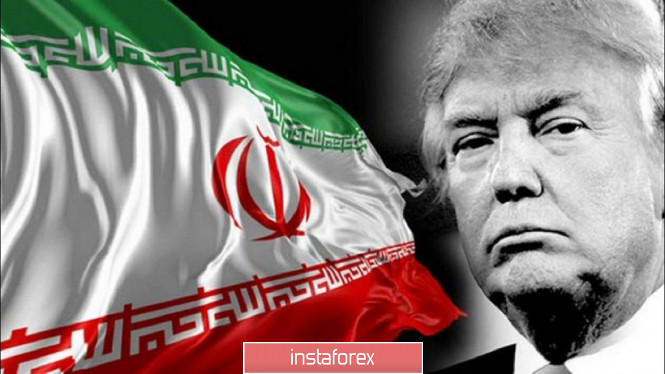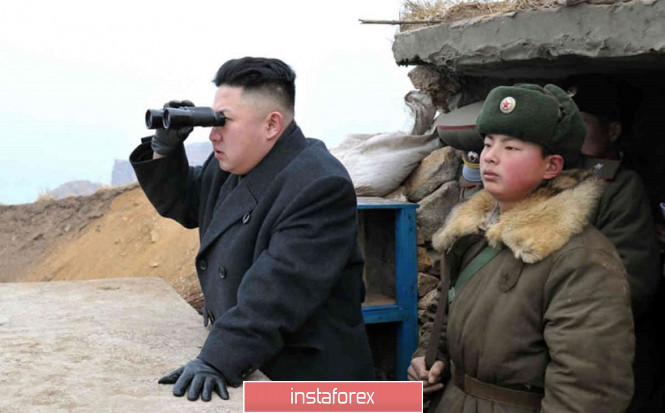The fundamental background in the currency exchange market has changed dramatically literally in a day: anti-risk sentiment has prevailed again, increasing interest in protective instruments. The yen is already testing the 107th figure, and gold has updated a 3-month high, showing impulse growth. At the same time, the American currency was also among the beneficiaries of this situation: the dollar index is growing, as the dollar is traditionally in demand during periods of geopolitical tensions.
It should be noted right away that anti-risk sentiments are growing not only due to the assassination of the Iranian military leader by the US military - the latest news from the DPRK and Turkey also made their respective contributions. Due to this, recent events have been overshadowed by many fundamental factors that traders of the EUR/USD pair have focused on. Moreover, optimism regarding the prospects for US-Chinese relations gave way to anxiety about a possible retaliatory action by Iran. Indeed, in the opinion of the overwhelming number of political experts, the Iranians will take retaliatory steps in any case - the only question is how large and deadly they will be. Such a nervous situation puts pressure on EUR/USD, primarily due to the growth of the American currency throughout the market.

Let me remind you that the international airport in Baghdad was bombed last night, as a result of which the Iranian general Qassem Soleimani, who led the special unit of the Islamic Revolutionary Guard Corps, was killed. A few hours after the air raid, a Pentagon message appeared according to which a senior Iranian military commander was liquidated on the personal instructions of US President Donald Trump. In addition to General Soleimani, another 8 people died, including the deputy head of the pro-Iranian armed group Al-Hashd al-Shaabi, Abu Mahdi al-Muhandis. According to the American authorities, General Soleimani was engaged in "developing plans for an attack on US diplomats and members of the diplomatic service in Iraq and throughout the region." Moreover, The Pentagon accused Soleimani of approving the assault on the US embassy in Baghdad by supporters of the Kata'ib Hezbollah militia. This attack was committed on the last day of 2019.
As many analysts note, the death of such a high-ranking Iranian military official could be a turning point in the relations between Washington and Tehran. Iran's supreme leader, Ayatollah Ali Khamenei, has already promised "severe revenge" to those who killed the commander of the Iranian elite unit. Iranian Foreign Minister Javad Zarif, in turn, called the killing of Soleimani an act of international terrorism. After these threats, US authorities ordered the Armed Forces to be fully operational.
On the other hand, there is no consensus among experts about possible actions on the part of Tehran, and indeed - what will lead to another aggravation of the US rivalry with Iran. Many analysts believe that Iranians are attacking American targets in Iraq. The US command has already deployed additional forces to protect the US Embassy in the country, including a hundred marines and combat helicopters. Infrastructure or military facilities (or representatives) of US allies in the region may also be affected - first of all, we are talking about Saudi Arabia and Israel.
In the context of the currency market, the very fact of growing geopolitical tensions is important and not only military in nature. Let me remind you that in 2013, Iran threatened to block the Strait of Hormuz (though it did not fulfill its intentions at that time) - and now, there is a probability that Tehran will resume such threats. Meanwhile, oil has already updated its multi-month highs (in particular, Brent is approaching the $ 70 mark), exerting a corresponding effect on commodity currencies. If "black gold" holds out at these price heights, the European currency will receive its "reward" (though in time), as the growth of the oil market will positively affect inflation in the eurozone. But all this will be later: at the moment, the market is focused on possible retaliatory actions by Iran with regard to the States or their allies.
As I said above, the assassination of an Iranian general is not the only cause for concern for traders. North Korea made itself known again, and, as they say, "not on the best side" - on December 31, DPRK leader Kim Jong-un announced plans to no longer extend the moratorium on nuclear weapons tests. Earlier, the chief of the General Staff of the Korean People's Army, Park Jong-chon, declared the risk of the development of relations between the DPRK and the United States into a "full-scale armed conflict." The Pentagon, in turn, announced the readiness of the American side to respond to possible aggression from North Korea.

The fundamental picture of the day was supplemented by news from Turkey. Yesterday, the parliament of this country approved the sending of troops to Libya. The adopted document states that this conflict will affect Turkey's interests in the Mediterranean basin and in northern Africa if the Libyan government cannot stop the advance of the rebels and the clashes turn into a mass civil war. In other words, Ankara decided to intervene in the internal Libyan conflict, which has been in an active phase for almost a year. One side of the conflict is the internationally recognized government of national unity, which controls Tripoli, the other side is the "Tobruk government", whose armed forces are commanded by the leader of Libyan militias Khalifa Haftar.
Thus, the strengthening of geopolitical tensions will continue to exert pressure on the pair EUR/USD, due to the strengthening of the dollar. The pair overcame the support level of 1.1150 (Tenkan-sen line on the daily chart) and will probably overcome the second support level of 1.1110 (Kijun-sen line on the same time-frame). Most likely, the price will stop its decline in the area of 1.1060 - this is the upper border of the Kumo cloud on D1.
The material has been provided by InstaForex Company - www.instaforex.com